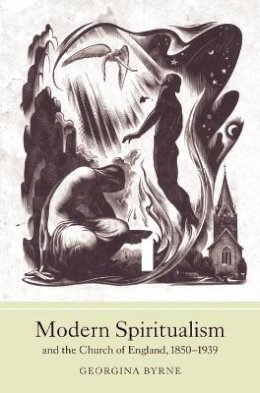
Stock image for illustration purposes only - book cover, edition or condition may vary.
Modern Spiritualism and the Church of England, 1850-1939
Georgina Byrne
€ 122.55
FREE Delivery in Ireland
Description for Modern Spiritualism and the Church of England, 1850-1939
Hardback. Shows how some of the ideas about the afterlife presented by spiritualism helped to shape popular Christianity in the period. Series: Studies in Modern British Religious History. Num Pages: 268 pages. BIC Classification: 1DBK; 3JH; 3JJ; HBJD; HBLL; HBLW; HRAX; HRC; HRQM2. Category: (P) Professional & Vocational. Dimension: 237 x 162 x 28. Weight in Grams: 568.
Shows how some of the ideas about the afterlife presented by spiritualism helped to shape popular Christianity in the period. From the moment of its arrival in Britain in 1852, modern spiritualism became hugely popular among all sections of society. As well as offering mysterious and entertaining séance phenomena, spiritualism was underpinned by a beliefthat the living could communicate with the departed and even come to know what life after death looked like. This book, offering the first detailed account of the theology of spiritualism, examines what happened when the Church of England, itself already grappling with questions about the nature of the afterlife, met with such a vibrant and confident presentation. Although this period saw a gradual liberalising in the Church's own theology of heavenand hell this was not communicated to the wider public as long as sermons and liturgy remained largely framed in traditional language. Over time spiritualism, already embedded in common culture, explicitly influenced the thinkingof some Anglican clergy and implicitly began to permeate and shape popular Christianity - to the extent that even some of spiritualism's harshest critics made use of its colourful imagery. This study sets one significant aspect ofChristian doctrine alongside an attractive alternative and provides a fascinating example of the 'negotiation of belief', the way in which, in the interface between Church and culture, religious belief came to be refreshed and redefined. GEORGINA BYRNE is an ordained Anglican priest and currently Director of Ordinands for the Diocese of Worcester and a Residentiary Canon at Worcester Cathedral.
Product Details
Format
Hardback
Publication date
2010
Publisher
Boydell & Brewer Ltd
Condition
New
Series
Studies in Modern British Religious History
Number of Pages
268
Place of Publication
Woodbridge, United Kingdom
ISBN
9781843835899
SKU
V9781843835899
Shipping Time
Usually ships in 15 to 20 working days
Ref
99-15
Reviews for Modern Spiritualism and the Church of England, 1850-1939
A fantastic book.
PSYCHICAL STUDIES
A detailed and interesting study.
CULTURAL AND SOCIAL HISTORY
Byrne's book offers a welcome and important addition to the field. Her sources are charming, poignant, and thought-provoking by turn and, combined with her clear writing style, make the book appropriate for students as well as specialists.
VICTORIAN STUDIES REVIEW
Byrne's historiography is sophisticated and provocative, and her survey of Spiritualism's history could stand alone as an excellent introduction to the movement. [It] adds substantially to our growing awareness that the history of modern belief is not adequately represented by a narrative of irrelevance and decline.
MELBOURNE HISTORICAL JOURNAL
Has much to recommend it as a contribution to the social history of the Church of England. [It is] is well researched and clearly structured, and it will intrigue anyone concerned with the often elusive boundary between English church and society in the nineteenth and twentieth centuries.
JOURNAL OF ANGLICAN STUDIES
PSYCHICAL STUDIES
A detailed and interesting study.
CULTURAL AND SOCIAL HISTORY
Byrne's book offers a welcome and important addition to the field. Her sources are charming, poignant, and thought-provoking by turn and, combined with her clear writing style, make the book appropriate for students as well as specialists.
VICTORIAN STUDIES REVIEW
Byrne's historiography is sophisticated and provocative, and her survey of Spiritualism's history could stand alone as an excellent introduction to the movement. [It] adds substantially to our growing awareness that the history of modern belief is not adequately represented by a narrative of irrelevance and decline.
MELBOURNE HISTORICAL JOURNAL
Has much to recommend it as a contribution to the social history of the Church of England. [It is] is well researched and clearly structured, and it will intrigue anyone concerned with the often elusive boundary between English church and society in the nineteenth and twentieth centuries.
JOURNAL OF ANGLICAN STUDIES
